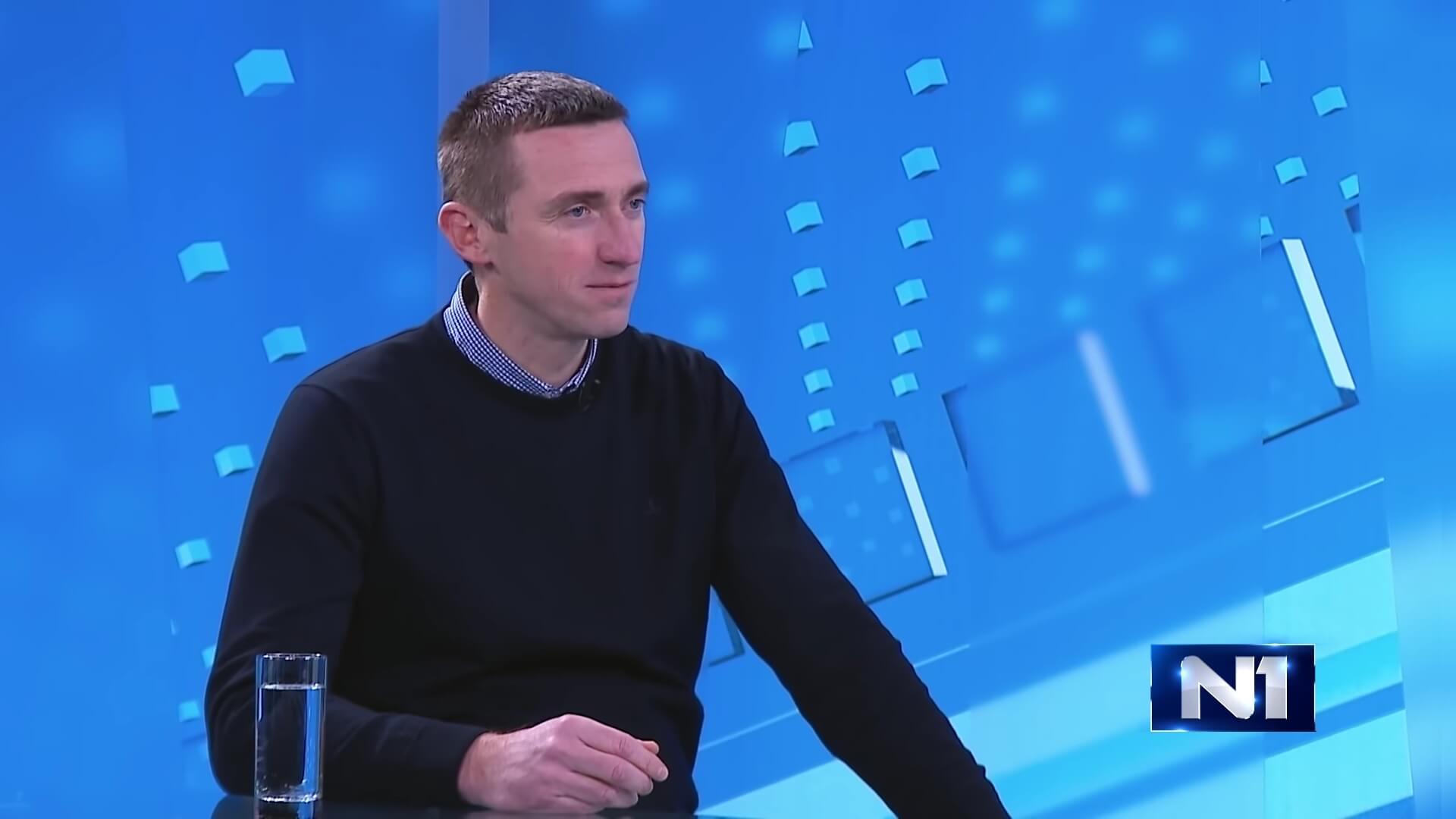RIP Vladimir Matijanić, Index.hr Investigative Journalist
August 6, 2022 - Index.hr reported yesterday evening that their journalist Vladimir Matijanić passed away.
In their original article, they call him "our best journalist", and his long, successful career confirms that they're probably right. Matijanić was 51, born in Livno and was a dogged investigative journalist. He started his journalistic career in Slobodna Dalmacija, then continued in the weekly Feral Tribune, then again in Slobodna Dalmacija, and in recent years worked on the Index.hr website. He uncovered and reported on numerous scandals in the Croatian politics, which lead to him being sued often by those who felt wronged by his precise reporting. Among his more important journalistic works and discoveries was the falsified master's degree of Ante Đapić at the Faculty of Law in Split.
Also, while working for Index.hr, Matijanić was the first to report on the dubious portions of the doctoral thesis by then-HDZ-candidate in the Split mayoral elections, Vice Mihanović. In a series of texts, Matijanić warned about a series of illogical and bizarre elements of Mihanović's doctoral dissertation which he defended in 2018 at the Faculty of Economics in Osijek. For that work, he received the Marija Jurić Zagorka award for internet journalism, awarded by the Croatian Journalist Society (HND). In their explanation of why he was given the award, HND said: "Matijanić dissected it with journalistic precision, proving that the doctorate was a farse, while the parallel reality of politics and the politically poisoned academic community did everything possible to prove that nothing was wrong with the thesis. Matijanić also relentlessly reported on this, building a story about the doctorate and the politician Mihanović, but also about the Croatian reality. Therefore, his entire work on the 'Mihanović case' is an extremely valuable 'story about Croatia 2021'. His journalistic work is undoubtedly one of the highest journalistic achievements of the past year and deserves the recognition of the profession".
Matijanić also authored the book 'Kerum and the Decline of Split'.
Today, the story of Matijanić's passing got another chapter, as his partner (and another Index.hr journalist) Andrea Topić published on Facebook and on Index a very disturbing account of the last several days of Matijanić's life. She accused the Split health services of numerous oversights, ignoring how serious Vlado's situation has gotten (including refusing to hospitalise him 2 hours before his passing!), the complete lack of Paxlovid in any of the Split hospitals and much more. Vili Beroš, the Minister of Health confirmed to index.hr that he's ordered the inspection, aimed at determining the circumstances of Vladimir Matijanić's passing.
Malena Passed Away: Croatia Mourns End of Klepetan and Malena Stork Love Story
July 7, 2021 - Croatia is sad to learn of the passing of beloved Malena, thus ending the heartwarming love story of the most famous storks in Croatia - Klepetan and Malena.
Nineteen years of stork romance between Malena and Klepetan in the Slavonian village of Brodski Varoš (near Slavonski Brod), has sadly come to a tragic end. As Index.hr reports, Malena passed away after failing to eat for eleven days.
''I tried to feed her but it didn't work,'' said Stjepan Vokić, a former janitor who found Malena 28 years ago. The year was 1993, and Malena was injured (her wing had been shot) so Vokić rescued her, and the two spent time together, awaiting the arrival of spring. As Malena couldn't travel due to her injured wing, she could only rely on Vokić to help her through tough winter months, and she kept him company.
In 2002, another important man (well, actually a male stork), Klepetan, showed up in her life, and the couple gave life to 66 small storks. Their love was challenged with Klepetan, doing what storks do, fleeing to Africa every autumn. However, Malena waited for him, and he couldn't forget her either, and their occasional long-distance romance indeed grew into true love and not just a summer fling.
''I noticed she wasn't well on June 9. It was just when the heatwave started. She wanted to go after Klepetan, but she couldn't. She fell down, and I brought her inside. She didn't want to eat nor did she want to drink any water. It was as if she wanted to end her life because falling down is a humiliation for storks, I'd say,'' Vokić said to Večernji List, adding that she passed away peacefully, closing her eyes while on the lap of one of Vokić's friends and dying.
The romance of Klepetan and Malena was followed globally, and many Croatians mourned when the news broke out. Naturally, nobody took it harder than Klepetan.
''He comes every evening. I tell him, 'she's gone now, Klepo'. I buried her in her favourite place where she always waited for him,'' said Vokić.
He added that he would wait for Klepetan and welcome him to his place if he decides to return next year.

Stjepan Vokić who rescued and took care of Malena, screenshot / Jelena Osijek OS
The 19-year romance of Klepetan and Malena couldn't have gone unnoticed for us here at TCN.
Klepetan returned every year (sooner or later), and in 2019, many feared that the love story had concluded with Klepetan's death.
"Four of them (birds) came and began making some very sad noises. I knew then that Klepo had gone, he had died. You know how they say that birds die singing," Vokić sadly said in 2019.
However, it was, fortunately, a false alarm, as Klepetan returned in 2020.
At least Malena's love story, while challenging, was much happier than the famous literary tragedy, as she was happily in love and the 66 kids of Malena and Klepetan raise the stork count in Croatia, adding to Croatia's bird population and general biodiversity.
Storks are beloved guests at Lonjsko Polje. Learn more on our TC page.
For more about animals in Croatia, follow TCN's dedicated page.
Zagreb Gay Pride 2021 Analysis: Issues Still Exist, Pride Celebrates History and Present Equality
July 5, 2021 - Gay rights in Croatia still have challenges ahead, but even if all problems are resolved, Pride should remain a commemorative event. A look at the history of gay culture in Croatia and the current climate in this Zagreb Gay Pride 2021 Analysis by TCN reporter Ivor Kruljac.
Zagreb Pride is the oldest pride in Croatia. First held in 2002, it attracts more and more people every year, from LGBTQ members, straight people that support gay rights to NGOs, human rights activists, and even politicians from the left and liberal specter. Over the years, the event grew from a one-day pride to Pride month, full of educational and entertaining events regarding LGBTQ issues and a chance for people with the same preferences to meet and celebrate who they are.
Pride month is marked in June in honor of the 1969 Stonewall Uprising in Manhattan.
„The Stonewall Riots, also called the Stonewall Uprising, began in the early hours of June 28, 1969, when New York City police raided the Stonewall Inn, a gay club located in Greenwich Village in New York City. The raid sparked a riot among bar patrons and neighborhood residents as police roughly hauled employees and patrons out of the bar, leading to six days of protests and violent clashes with law enforcement outside the bar on Christopher Street, in neighboring streets, and in nearby Christopher Park. The Stonewall Riots served as a catalyst for the gay rights movement in the United States and around the world“, reminds History.com.
When it comes to LGBTQ in Croatia, as you can expect with the ideological divide Croatians generally experience, there are mixed feelings on the issue.
From street violence to a family event
Participating in the first Pride in 2002 required that if you are a man loving a man ready to openly admit it, you had to have balls.
The attacks by skinheads and other „morally concerned citizens were fierce and violent. Participants truly needed police protection which was provided but also needed to be careful to not get hit by the incoming rocks that were thrown among the participants.

Police arresting violent skinhead at the first Zagreb Pride in 2002, screenshot / Zagreb pride
But, at least for Zagreb, the situation got better and more open. Today, pride is the forthcoming celebration of love and freedom, and entire families can be seen to join the picnic at Ribnjak park to teach their children tolerance and that people are not sick or different from others because of their sexual preference. Other larger cities in Croatia, such as Split, slowly but surely, do follow that path too, and Rijeka, the pinnacle of liberal Croatia, is also a very gay-friendly city.
Of course, a political counterstrike is expected and quite strong. The first most notable one was the 2013 referendum, where it was voted that the Croatian constitution declares marriage as a „community between a man and woman“. The goal was to deny LGBTQ couples the same rights as enjoyed by straight people.
However, the bill on life partnership outplayed that attempt.
In the meantime, LGBTQ couples can also adopt children in Croatia, as Constitutional Court concluded that gay couples fostering children is not against the Croatian Constitution.
That decision and along with the general openness of Croatia towards LGBTQ was followed by a controversial carnival in Imotski where an effigy of a gay couple was burned. President Zoran Milanović demanded an apology from the organizers, and SDP's MP Arsen Bauk filed charges against the organizers.
Counting pluses and minuses, the report on Croatia being the 39th best country for LGBTQ visitors still seems to uphold. No changes for the better, but at least Croatia is still in the top third for this category of tourists.
Haters strike back
2020 and 2021 sadly saw the uprise of violence towards LGBTQ in the Croatian capital. Apart from the occasional tearing down or burning of the rainbow flag, Croatia was shocked with an attempt of burning a man in Maksimir Forest Park as well, with his sexual preference being the sole motive for the attack.
On the other side, this year's pride felt to start stronger than ever. The newly elected mayor Tomislav Tomašević joined the parade, along with stating that Zagreb is a city that is open to everyone. This year arranged a bit differently to adhere to corona measures; around 2500 participated in the event.
„Twenty of our prides made our city and our republic a better, more democratic, and joyous place for the life of all citizens“, was the main message of the 20th edition of Zagreb Pride.
As reported by Index.hr, the Zagreb Pride association representatives stated that the Croatian LGBTIQ community „became a powerful, responsible and self-aware part of the country, but that the fight isn't over“.
„Our constitution and our laws still do not include in a complete and fair way. Our streets and squares are still not free of hate. We didn't forget nor we will forget victims of homophobic and fascist rampage in this year and all previous years“, stated Zagreb Pride.
Sadly, while Pride itself went without issues, participants of the pride who walked the streets of Zagreb after pride with rainbow flags faced a series of physical attacks on several locations in Zagreb.
A week ahead of Pride, conservative MOST Party parliament member Nikola Grmoja complained that commercials displayed during EURO 2020 commercials were LGBTQ propaganda and that kids need to be protected from it and announced that he might include it in his anti-pedophile package. Grmoja's statement caused strong disagreements among the Croatian public, with several people (including celebrities) teasing him that if he wants to start battling pedophilia, he should start from church (as Grmoja is quite clerical). Božo Petrov, president of the MOST party, added more fuel to the fire when he supported Grmoja, stating that „minorities can't dictate what my children can learn in school“. He added that minorities need to be aware that they are minorities and that „we tolerate that," sparking more enrage from the public, with many comparing MOST to the controversial Hungarian Prime Minister Viktor Orban.
Zagreb Pride linked the post-Pride physical attacks with Petrov and Grmoja's public statements, and Petrov and Grmoja announced they would sue Zagreb Pride for slender.

Nikola Grmoja, screenshot N1
The Law: "Gay is OK". Popular opinion: "Do it in your homes, not on the streets".
In this political escalation, what does the average Croatian think? Looking at the comments on social networks, it seems the majority of Croatians don't mind gays being gays and living how they like (even if they are not always happy with legal rights the LGBTQ community received). But, one sentiment in that „tolerance“ is particularly worrying.
„Live in your house however you want it. You don't have to wave around, like its a best thing ever“, said one of the online comments on Index.hr beneath the news on Petrov and Grmoja.
So it seems the public does not understand why Pride is important. First of all, as evident, the political climate is such that the battle for equality truly isn't over in Croatia, and Pride is the best way for the community to express what issues LGBTQ still face in Croatia. Additionally, pride month is also educational and supportive, and public presence show to other people who feel the same that they are not alone, as they might feel lonely and unable to find people who feel the same in everyday life.

© Zagreb Pride
But, even if the law and constitution give the same rights and solves the problem of intolerance of LGBTQ people completely, does that mean that Pride should then be canceled? Well, Croatia won its independence and the war in the nineties. Does that mean we should stop commemorating the Homeland War? Or is it nice to honor and celebrate the victory and triumph over all obstacles Croatia had to face in its independence? Pride is a cultural, commemorative event honoring those who were or still are victims and oppressed for their sexual preference, either in Croatia or in the world. Croatia is a democratic country. Every group, national, ethnical, racial, religious, etc. should have the right to gather and honor its heroes. The right to gather and honor its tragedies and their dates and connect with other people who feel the same. If political elites are so concerned with keeping Croatians in Croatia, then they can't afford to discriminate or attack part of Croatian society solely based on their sexual preference. A preference that, unlike being violent or intolerable, can't be chosen.
Learn more about LGBT rights in Croatia and what LGBT tourists should know on our TC page.
For more about LGBT in Croatia, follow TCN's dedicated page.
Maritime Welfare in Croatia: Drvenik Case and What Law Says
June 25, 2021 - The issue of maritime welfare in Croatia was raised once again after a heated discussion on a beach in Drvenik Veli. Here are the details of the case and legal guidance to the maritime welfare in Croatia.
With the 2021 tourist season already being 58% better than 2020, tourists once again visit Croatia as one of the top holiday destinations.
However, like any year, the season can't go without at least some sort of incident.
Lovely beach, disgusting words
Yesterday, Croatia was shocked and enraged with the incident that happened on a beach on Drvenik Veli island (not so far from Trogir). Croatian journalist Tonka Alujević and her friend went to a beach where two Czech tourists started complaining that it's a private beach, perks of paying for a villa, and that Alujević needs to leave. Alujević refused to leave, stating that beaches are maritime welfare and cannot be privatized, refusing to move. After, as Alujević claims Czech tourists hit her head with a phone, they called the villa owner. 24 Sata daily newspaper published a video Alujević's friend recorded.
„Ma'ams, Ma'ams, how did you get here? On foot?“, asked the owner on a phone that was on speaker and held by the Czech tourists.
„I'm a journalist. Do you know Croatian laws? Do you want to end up in media?“ replied Alujević with a chill face while smoking a cigarette on a sunny day at the beach.
„Come on, put me in the media, come on put me! But first, go to the land register and see that my beach is private," screamed the owner in Croatian, with a lot of derogatory phrases (if only Czech tourists had a translator to understand the rich swear word heritage of Croatian language, right?)
The whole thing ended up with inspection stepping on the scene. Despite the video footage being clear, the owner, identified by Index.hr as Tomislav Meštrović, owner of Centovi Dvori Villa, tried to justify himself, saying everyone is welcomed at the beach, and he attacked the women because they passed through his doorway.
„No, I have no idea what video, who what... who knows what that is... I called the police for trespassing through my land“, said Meštrović to Index.hr when asked about the footage.

the conversation at the beach, screenshot/ 24sata
Law and order
Following this story, Index.hr's columnist Goran Vojković analyzed the law to clear up the issue of maritime welfare.
„The Maritime Welfare and Sea Ports Law states 'at least six meters from a line horizontally distant from the line middle waters'. But it can be wider, for example, if part of the land that in its nature or use serves to exploit the sea. It can also be narrowed- for instance, if support walls or a public road are close to the sea“, Vojković listed general rules but adding that maritime welfare border is specifically determined.
„So, the coast is free to use where the beach is, in general, six meters. You can come and use it for your needs, such as bathing, tanning, or walking. The land behind can be private, but the coast cannot“, concluded Vojković.
On the other hand, there are ways to limit the use of maritime welfare.
„There are some parts of the coast where you cannot enter. You can enter the marina and walk around it, but only until 10 pm. You cannot enter at all in a shipyard port. Those are the parts of maritime welfare for which the state assigned a concession to someone. The concession can limit or terminate public use“, explained Vojković.
Additionally, the law states that it is possible to have a beach in its concession and limit public entrance. But it needs to be registered, and the prices are so expensive that there are very few beaches like this in Croatia (Drvenik one not included in that small list).
„If someone claims that has a concession and that he/she can exclusively use some part of the coast, he needs to have a proof you can easily check in the register. I repeat, there are very small examples; even beaches in front of five-star hotels are public good“, Vojković pointed out.
And such beaches are filled with deck chairs, food stands, etc. But as Vojković pointed out, on a public beach, you have the right to bring your own deck chair, your own food, and drinks, and you can't be forced to consume content on the beach.
„In short, enjoy the Adriatic coast- with some very small exceptions of exclusive concessions, the entire coastline (including island coast) is free for your use and joy. Nobody can hold a grudge or complain if you came to a bath where they think it's 'their' beach. If someone is uncomfortable, don't debate, call authorities“, advises Vojković.

Pixabay
And the beach is open for public happily ever after
As Jutarnji List reported, the Drvenik case has a conclusion to an intriguing plot. Unhappy with Meštrović's behavior, Dalmatian locals went vigilantly and started writing bad reviews on Google, seeing the villa losing its value and tourists.
„Even though neither the building, nor its surroundings changed since the video was released, the unkindness of the owner was enough to move once-prestigious villa to the lowest grading Croatian places on Google“, says Jutarnji.
A couple of more lessons can be learned for a successful and enjoyable season from this tale.
For owners: present your offer fair in accordance with the law as transparency is the best way for your offer to beat the competition.
For tourists: if you were promised a private beach, but you see locals coming, don't be rude to them and don't attack them. The only one you can really be mad at is your host, who perhaps lied about what they can truly provide.
Learn more about beaches in Croatia on our TC page.
For more about travel in Croatia, follow TCN's dedicated page.
Ending Segregated Education in Vukovar? Mayor Ivan Penava Announced an Idea
June 25, 2021 - Is there any possibility of ending segregated education in Vukovar? Mayor Ivan Penava announced Serbian and Croatian education could merge in school and kindergarten levels, but more details are yet to be revealed.
The start of the week saw interesting news that surprised many. As reported by N1, Ivan Penava, the mayor of Vukovar, announced Croatian and Serbian classes and kindergartens could merge together.
Vukovar, often referred to in Croatia as the „Hero City“ for the heavy blow it suffered in the 90s war Croatians refer to as Homeland War, still has a lot of ruins as memories of that ugly past. In the light of national tensions among Serbs and Croats, the segregation of kindergartens and different shifts in schools for Serbian and Croatian classes seem to be a solution to keep the peace.

screenshot/ N1
Good idea but more talks needed?
„In Vukovar, parents do not choose the model of education that is imposed by politics, it is nowhere written in public“, said mayor Penava, as reported by N1.
Penava, a former member of the Croatian Democratic Union (HDZ), despite earning a new term in the recent local elections as an independent candidate, enjoyed support from Miroslav Škoro, runner-up candidate for Zagreb mayor elections, and the leader of the Homeland Movement (DP) supports Penava's idea.
„I lived in America for a number of years, in Hungary, I traveled the world... what is the difference between Serbian and Croatian mathematics? Is Argentina in Serbian in the northern hemisphere, and southern in Croatian? I don't get it“, said Škoro adding that segregation was done in malice with a tendency to divide children from the start.
„In Vukovar, the symbol of defense had priorities. Reconstruction of the water tower, and certain moves Penava did well in his last term (he wouldn't win elections if he hasn't), thinks that city needs to move on. I support him 100%“, concluded Škoro.
On the other hand, criticism is erected on national-level politics.
„I don't think that local officials are the ones who need to determine a way in which minority education will be conducted. Political trade is clear here, and I'm glad there is no longer just Serbian-Croatian trading coalition, but also another one“, said Dragana Jecov, a Croatian parliament member from the Independent Democratic Serb Party (SDSS) referring to the accusations of the right-wing that current coalition of HDZ and SDSS and is vile political trade.
Interior Minister Davo Božinović also said that while we need to work on erasing national, social, and political tensions, but this is a question that needs to be discussed more seriously.
Additionally, as N1 reported, the Ministry of Education pointed out that different models of education for Vukovar schools exist, and parents can choose which they find most suitable.
Accepting national differences or nationalistic uniformity?
Some improvements have indeed been seen in the city infrastructure, but Vukovar still remains a challenging place to live. Partly due to the tough economic situation, but also because of discrepancies among Serbian and Croatian residents. Earlier in June, there was even a violent incident when a 30-year-old Serbian member of the Grobari football fan group physically attacked a Croatian 13-year-old boy in front of a bakery for having a medicine mask with Croatian symbols.
„Sadly, this kind of thing happened too long in Vukovar, where people attack each other because of national disputes. Media aren't even introduced to some of these events. It is spread a lot, as evident by the constant police patrols around Vukovar high-schools where there are always police cars around“, said Vukovar police to Večernji List daily newspaper.
Such incidents, a misfortunate loose ends of the war, also come from the Croatian side. Earlier in May, a group of young men chanted anti-Serb slogans in Borovo Selo (close to Vukovar), a scene of heinous war crimes in the '90s), sparking condemnation from both president Milanović and the Croatian Government.
In that light, integrated schools might finally bring positive changes in regards to tolerance and peaceful life for Vukovar citizens. But again, not everyone sees the glass as half full.
Index.hr columnist Gordan Duhaček agreed in his column that Serbs and Croats don't need to go to separate shifts but warns how Penava isn't the guy that should unite them.
„Penava doesn't want to integrate Vukovar schools and end the troubling segregation in a way to ensure a better future for the whole city, but instead to impose his nationalistic, often anti-Serbian narrative as the official one. Penava wants that Vukovar Serbs bow down to his view of the Croatian state“, wrote Duhaček.
Duhaček also reminded the readership of the attempt and fail of the Danube International school that supposed to integrate pupils of both nations, an idea that spawned 16 years ago. But, the project failed, and Duhaček sees both Penava and SDSS leader Milorad Pupovac not feeling too sad about it.

Iconic Vukovar water tower, pixabay
Questions on details
At the end of the week, the situation seems more confusing than clear. Is class integration a good idea? Could it save money for the city financially? What are some actual details of merging Croats and Serbians into one class? Obviously, Škoro is right that 2+2=4 in any math class around the world. But, troubling questions appear in subjects such as language and history. Croats and Serbs sadly have their own, different interpretations of historical facts, particularly when it comes to the last war, and while the speakers of two languages perfectly understand each other, some words do differ, and there is a different accent and spelling in the two formal languages. So, how can these issues be resolved? Would those two subjects remain in different shifts while universal subjects such as biology, math, or physics will listen in one merged classroom? Or will there be a different curriculum that would present both Serbian and Croatian history, Serbian and Croatian literature in that way, making Vukovar pupils more knowledgable in those areas than other pupils in the country?
Or some curriculum consensus on history could be reached, one that would satisfy both the Croatian and Serbian sides and thus truly open a doorway to the better understandings of the two nations in the future in perhaps the most nationally torn city in Croatia?
Obviously, Vukovar city authorities have some tensions with SDSS, but the city also has an expert associate for the development of civil society and national minorities, Siniša Mitrović in one of the City's departments. Did Mitrović manage to gain input from the Serbian minority in Vukovar about this merge? And how fast could the whole thing be realized? This autumn or maybe a bit later?
These are important and interesting questions that can only be answered either by mayor Penava himself or perhaps Josip Paloš, the director of the Vukovar City Education Department.
„Mayor Penava is in a lot of meetings and on fields, and his schedule is full. We will sadly not be able to answer you by your Friday deadline, but we will contact you at the earliest convenience“, said the lady at the Vukovar City PR service when I called them (and E-mailed) with a wish to arrange and conduct a brief phone interview.
While this article may present the current issues surrounding segregated education in Vukovar, this TCN reporter hopes mayor Penava will share more details about his plan on ending segregation in Vukovar schools and kindergarten with joint classes. If done right, this move can indeed be the way to a better, more peaceful future for Vukovar citizens.
Learn more about Vukovar on our TC page.
For more about education in Croatia, follow TCN's dedicated page.
New Zagreb Mayor Tomislav Tomašević: Sandra Benčić (Mozemo!) On First Moves
June 1, 2021 - With the new Zagreb Mayor Tomislav Tomašević soon coming to the office, Sandra Benčić of the green-left platform Mozemo! (We Can!) spoke to Index.hr about the first moves of the new administration.
Following intense post-first round campaigns in Zagreb for the second round of local elections, Tomislav Tomašević is the new mayor of Zagreb. Additionally, Tomašević's green-left coalition Mozemo! earned 23 seats in the City's assembly, and if the previously announced support of the Social Democratic Party (SDP) that has five, Mozemo! will have the majority in the assembly.
The new mayor is expected to take his seat by the end of this week, and as Index.hr reports, Sandra Benčić, the Mozemo! MP says that ZG Holding chief and directors can be removed from their position immediately.
However, first and foremost, the earthquake damages seem to be taking the lead.
„The most urgent thing is to prepare documentation for the reconstructions of kindergartens, schools, and institutions in the city ownership that were damaged in the earthquake. We have to do that as fast as possible because the deadline to pull money from the EU Solidarity Fund is June 2022. I'm afraid there will be a fiasco regarding how much will the State pull from the fund, but we can only take the money for estates in the city property, and the damaged kindergartens and schools are our priority“, told Benčić for Index.hr
She added that they plan to start an Office for Zagreb Reconstruction and establish mobile teams which will help citizens to fill in documentation and requests for the reconstruction of damaged homes.
Regarding the statement about the fiasco with the State pulling money from Solidarity Fund, the conflict with the government was sparked yesterday when PM Andrej Plenković talked to the press regarding Tomašević's victory. He said he didn't congratulate Tomašević yet, but he will and that he expects good cooperation.
„I see that Mozemo! is paraphrasing my message from 2016 when I said that we are changing Croatian Democratic Union (HDZ) so we can change Croatia. They say they are changing Zagreb to change Croatia. Clearly, they have something against this Croatia“, said Plenković, sparking controversy.
And Benčić is not the one to remain silent on such statements.
„Yes, we do have something against this kind of HDZ and evening HDZ with the State. They are not the State but an interest group that trapped our country. We want to see the country returns to all its citizens and that, of course, hurts them to the level that the prime minister allows himself these kinds of statements which, if they weren't malice, would be at minimal, unsmart“, said Benčić.
With the biggest number of votes in the history of mayoral elections in Zagreb, Benčić continues they are ready to justify this trust, and they start with work immediately.
„We are going with the financial revision of City's administration, restructuring City offices. We will do it step by step and connect offices while ensuring that functions and services need to deliver to the citizens. It should be noted that Zagreb used to have fewer offices, 17 until 2000 and then offices start to grow exponentially, only to put politically suited people to positions and raise their payments“, explained Benčić.
And the new Mayor Tomislav Tomašević also gave an interview on Monday. As Jutarnji List reported, Tomašević also talked about his plans to improve Zagreb and fulfill his promises, particularly with so many earned votes.
„This big trust is also a big responsibility. Citizens can expect that we will lead by example from the start. The city administration and authority will be based on three things: decency, modesty, and being at the citizen's service.
He also added that Mozemo! is considering filing a lawsuit against Miroslav Škoro for the filthy instigating campaign, as Tomašević and many other public figures described it.
„I wouldn't like this to happen to anyone anymore on any other elections in Croatia, regardless are we talking about a candidate from the right, left or center," commented Tomašević.
Although no direct link can be proved at the moment, Škoro's rhetoric could've been the fuel for the attacker that set fire to the Mozemo! election headquarters at Zagreb Contemporary Museum on the election night saying to the gathered that „they are communists“ and how he will „kill them all“, on which T-portal reported.
The elections are over, but will Zagreb continue to celebrate in such a majority as it did on election night? This is something only Tomašević on his new function can answer in the following months and years.
Learn more about Zagreb on our TC page.
For more about politics in Croatia, follow TCN's dedicated page.
Why Did HTZ Block Instagram Profiles Promoting Croatia?
August 24, 2020 - Another illogical move in Croatia. The Croatian National Tourism Board blocked Croatian photographers on Instagram who promote the beauties of Croatia.
After Index.hr received a couple of messages from Croatian photographers, they started to dig.
"It is awful to block people who work on the promotion of Croatia," one of the blocked photographers complains to Index.hr. The Croatian Tourist Board said that they blocked only those who "steal", "falsely present themselves," and "with whom they are in court". As Index.hr has investigated, most of the CNTB's accusations do not stand. Index.hr was convinced by the fact that after their inquiry about the photographers, some profiles were unblocked.
The Croatian National Tourist Board has more than 10,000 posts and more than 378,000 followers on its official Instagram profile. Most of the photos are actually from other profiles, and the photos are signed with a link to the original profile where they were posted. The promotion of Croatia should be important for the CNTB, and for those who publish photos to get a larger number of views, and thus followers. However, the CNTB, as Index.hr finds out, blocked part of the photographers and did not download or share their content on the official Instagram profile of the CNTB.
Blocking a profile on Instagram means disabling a blocked profile from accessing your profile and preventing it from seeing posts. Also, blocking on Instagram prevents sending messages, tagging in pictures, and any communication between the profile that blocked and the one that is blocked.
By blocking the photographers, the CNTB also prevented the CNTB from tagging their photos, as well as any communication on Instagram.
"We try, we do their job, and they block us."
“We try so hard and instead of giving us a hand because we work globally, they block us all,” one of the blocked photographers complained. But none of them understand why this is being done. "It's frivolous and childish and no one benefits from it. We can watch CNTB announcements through other profiles, and other people can still enjoy promoting Croatia as a beautiful country on our profiles," another photographer complains.
The Croatian National Tourist Board claims that they have extremely successful cooperation with a large number of relevant, successful, proven and internationally recognized photographers and that they do not have any photographers blocked on their profiles.
CNTB: The problem is copyright and misrepresentation
"So far, we have had a successful collaboration with photographers on our social networks, but, unfortunately, we were forced to terminate our collaboration with one photographer due to the question of valid copyright over the photo that she published as her own and confirmed in writing. Namely, a third person appeared as the author of the disputed photo, and a court proceeding related to copyright is in progress," the CNTB told Index.hr, without specifying who it was.
The CNTB, in response to an Index inquiry, said that each author the posts themselves contact and ask permission to post the photo. Index.hr asked the CNTB why they block the profiles of some photographers.
"They use false information"
"These profiles used 'false information', or they were presented as official profiles 'in charge of promoting Croatia in the world. We are responsible for marketing Croatia overseas as a leading holiday and business tourism destination' and used author's texts and content of the Croatian National Tourist Board without consent and approval, which violated the copyright (of the texts). We reported this via Facebook for false presentation or use of the content without permission, which was later downloaded by Facebook / Instagram," says the CNTB's response.
Index.hr sent an additional query, stating that they unblocked some profiles after Index.hr first query was not answered.
As Index.hr checked, their misrepresentation answer was correct, but only for one page. This is the Instagram profile of Croatia, which is presented on social networks, specifically Facebook, as the "Croatian Tourist Board". The CNTB presented Index.hr with reports against that site.
For other profiles, for which Index.hr sent them inquiries, they did not give them any evidence.
Timotej: We should support each other and work for each other
The Timotej profile belongs to a Croatian photographer who was born in England, and who did not want to introduce himself by his full name and surname. His profile has more than 58,000 followers, and his photos promote the beauties of Croatia.
The CNTB says they cannot comment on why the site was blocked because "court proceedings are ongoing". In an interview with Index, Timotej says that he would certainly be informed about some kind of court proceedings, but he doesn't know it exists.
"All these beautiful Instagram profiles that post beautiful photos from Croatia are blocked by the Croatian National Tourist Board instead of supporting each other and working together. This is not a contest for the number of followers but our goal is to show the world the most beautiful places in Croatia and make people fall in love with Croatia," Timotej said to Index.hr.
Andrea Miličević: It is bad to block people who work on the promotion of Croatia
Andrea Miličević is behind the Instagram profile croatia_photography, which has almost 80,000 followers. Her profile was also blocked by the CNTB. She tells Index.hr that she has never received any notification of the reasons why she was blocked and has been blocked for five years.
"I honestly didn't try to find an answer. Underneath every photo that is not mine is the author, so there are no copyright infringements. In fact, people are extremely happy when a photo is published to them. I get inquiries about accommodation, trips every day it is extremely bad to block people who work on the promotion of Croatia," Miličević said.
Index.hr asked the CNTB to explain precisely why croatia_photography was blocked, but they did not respond.
For the latest travel info, bookmark our main travel info article, which is updated daily.
Read the Croatian Travel Update in your language - now available in 24 languages
Join the Total Croatia Travel INFO Viber community.
Gordan Duhaček, Journalist from Index.hr Website Arrested
Index.hr, an independent Croatian news site, reports on September 16, 2019 that one of their journalists, Gordan Duhaček, was arrested this morning.
As he was returning from Bosnia and Herzegovina to Croatia yesterday, he was told that the police were looking for him. He went straight to the police station in Heinzelova street as he returned to Zagreb, to see what that was about and discuss arrangements with them, as he was supposed to leave Zagreb today for a business trip. However, the police officers waited for him at the airport this morning, and have arrested him.
Supposedly, he was arrested because of the two tweets he published on his own personal Twitter profile. One of them is from the summer of 2018 (!), and the other one was written just a couple of weeks ago.
"Ispričao je i kako su ga na podu poprskali suzavcem te kako su ga u policijskom automobilu govorili da mu se ovo dešava jer se opire sistemu, jer nije poslušao njihovu naredbu istog trenutka te kako su oni najviši zakon i sl."
— Gordan Duhaček (@Prajdizan) July 26, 2018
Nedajbože da se itko opire sistemu. ?
ACAB!
The first tweet in question, given above, discusses how cops treat people while being arrested (sic!), and that you should obey anything the police tell you without any questions, as they're the highest law there is, and it was completed with the phrase ACAB. ACAB is a well known anti-police slogan.
The other questionable tweet is, in fact, a series of tweets in which Duhaček satirically rewrites a famous patriotic song Vila Velebita, to bring attention to the problem of waste-waters being released into nature without any management.
U čast hrvatskog jezera govana na Plitvicama i izlijevanja govana u hrvatsko more od Dubrovnika do Splita, prilagodio sam tom hrvatskom domoljubnom fenomenu poznatu domoljubnu pjesmu.
— Gordan Duhaček (@Prajdizan) August 21, 2019
A day after that tweet has been published, Duhaček wrote about how someone has reported him to the police over that joke, and how ridiculous it is on what the police resources are being wasted.
To follow the latest on this story, here is the original on Index.
EDIT: At 5:47 pm Index.hr reports that Duhaček is currently at the Misdemeanor Court in Novi Zagreb.
You can find the original lyrics of the Vila Velebita song on the Wikipedia page; here is the English translation for those of you wondering what it's all about:
EDIT: At around 7 pm, index.hr reported that Duhaček has been released from custody, having being fined 200 Deutsche Mark for his tweet mentioning ACAB. He said that the verdict on Vila Velebita will be issued in three days. And, yes, some fines in Croatia are still in Deutsche Mark, although they have been replaced in Germany and the rest of the world, except Croatian laws, back in 2002.
Journalists “Raise” Money to Help President Travel to Croatia's Match against England
Croatian President Kolinda Grabar Kitarović attended the recent football match between Croatia and Spain in Zagreb. Croatia scored in the last moments of the game, winning the match against the Spaniards, and the president was in a great mood after the game, reports Index.hr on November 18, 2018.
“It was a lot of stress, but I told you we would win. I congratulate all the players and manager Dalić. It was a good match and the outcome was uncertain until the very end,” said the president.
She watched the match among the fans. “Congratulations to all the supporters, they were great today,” said Grabar-Kitarović, adding that she was sitting next to the family of Jean Michael Nicolier, a Frenchman who died during the Homeland War while defending Vukovar.
On Sunday, Croatia will play the decisive match in the UEFA Nations League against England in London. The president said she would like to go, but was not sure whether she would have enough money.
“I do not know whether I will manage. The match is decisive, but I will attend the finals of the Davis Cup tennis competition, so I am not sure whether I will have financial resources to go to Wembley this year too,” the president told reporters.
Journalists writing for Index.hr, Croatia’s most popular news website, have decided to help the president travel to London. While it is not a secret that Index.hr is not a great supporter of President Kolinda Grabar-Kitarović, the journalists decided not to allow mere poverty to prevent the president from enjoying the football match.
The journalists searched their pockets and wallets and found 40 euro needed to pay for a flight to London. However, the flight is from Salzburg, Austria, since flights from Zagreb are terribly expensive. But when you do not have a lot of money, you cannot be too choosy. Index.hr says it would be best if the president were to collect the tickets this morning at its offices. The journalists will even drive the president to Salzburg, and in London, she will certainly be provided with a seat in the stadium’s main box.
As for spending the night in London, Index has a couple of friends in London where she can sleep.
Unfortunately, it is just a one-way ticket. Index says that, if the president really has to come back, perhaps some of her supporters might foot the bill.
For more on Croatia's president, click here.
Son on Drugs Charge? Can Drinks with Interior Minister Keep Prison at Bay?
Does a coffee a day keep prison away?


